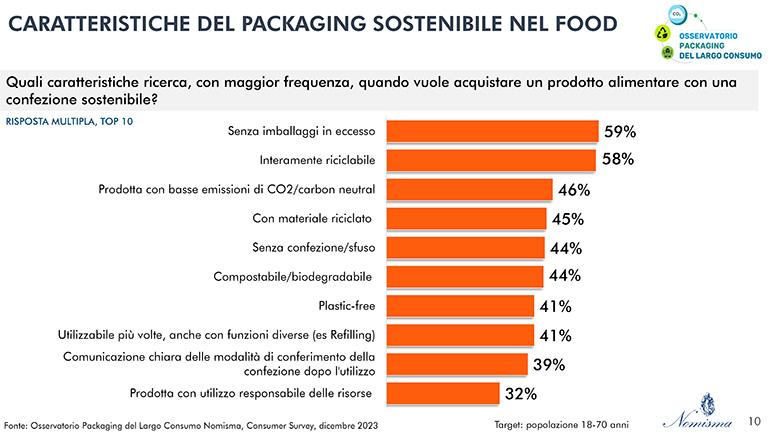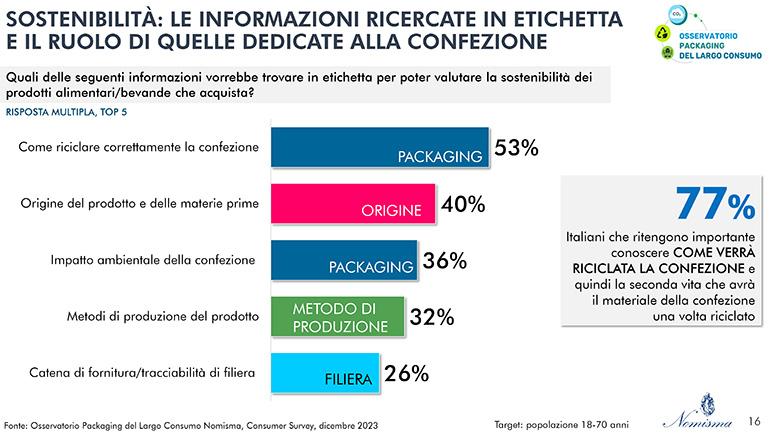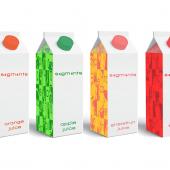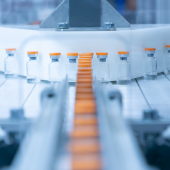Green packaging: a point of reference for consumers
This concept was discussed in the presentation and during the round table commenting the Nomisma Consumer Packaging Observatory, a key moment of Marca 2024.
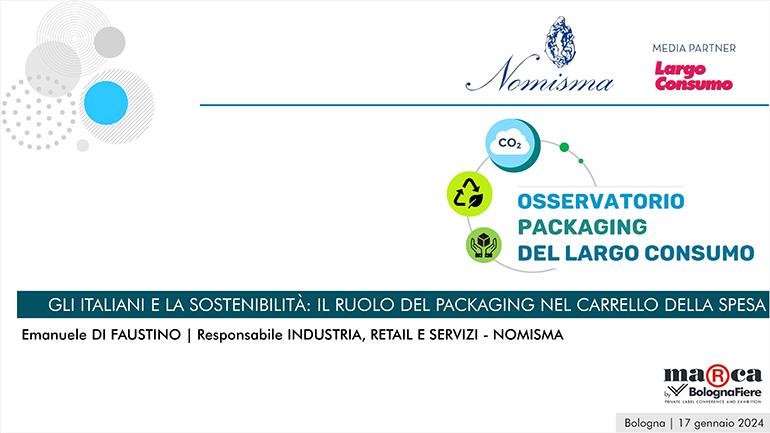
An unmissable appointment at the Marca trade fair (Bologna, 16 and 17 January), the presentation of the Nomisma Consumer Packaging Observatory is one of the most interesting and insightful moments of the event, followed, as per tradition, by the round table with end-users and operators of the calibre of Crai, Granarolo, FCLOG and CPR System and Tetra Pak.
Sustainability at centre stage
Again in the 2023 edition, recounts Emanuele Di Faustino - Head of Industry, Retail and Services at Nomisma - the key focus of the Observatory is sustainability, increasingly at the centre of Italians’ consumer choices, identified by researchers through a representative sample of purchase managers between 18 and 70 years of age.
Although inflation has reduced purchasing power, leading to saving strategies that orientate 55% of consumers towards the world of discount stores and 63% to branded products, the values revealed express an overlapping of economic needs and ethical considerations linked to sustainability.
It’s interesting to note that to limit costs, looking for the best offers is only one of the strategies, and is accompanied by more conscious consumption habits. These include a reduction of waste, interpreted by 71% of the sample as the elimination of excess and 59% preferring more frequent and selective purchases; these are two solutions linked to evaluations of an economic nature, but are also guided by a growing environmental awareness.
Not only economics
While concerns of a general economic nature are significant for 19% of the sample, the increase in food prices is the case for 18% and in goods, services and utility bills for 13%, and the climate crisis with its effects also has an impact, considered to be a key issue for 11% of Italians.
Consistent with this new trend, consumer habits are partly oriented towards reducing ecological impact, an aspect for which 1 Italian out of 2 declares to make more sustainable choices with respect to 5 years ago. The focus is, in particular, on the consumption of water and energy, the centre of attention for 82% of families, while 66% select foods and drinks and 42% are changing mobility and movement strategies.
An increasing focus on green packaging
Looking at consumer goods, growing attention is paid to packaging which is required to be sustainable in terms of materials and design, but useful also for obtaining more information on the product. Packaging therefore plays a central role in both the marketing and communication of the product, evaluated by consumers on the basis of different aspects. 59% pays attention to over-packaging, 58% to entirely recyclable packaging, 46% to products with reduced CO2 emissions, 45% with recycled material and 44% biodegradable, besides plastic-free and reusable products.
To have one or more of these sustainable options, 40% of consumers are willing to increase the purchase of products characterised by green packaging and 68% have purchased own-label supermarket products for the packaging, which is considered more sustainable than other brands. Green packaging is, therefore, becoming more decisive in food-buying decisions, to the extent that 54% of the sample have changed brand for more sustainable packaging and 18% have abandoned habitual products because they are not considered to be green.
The contributions of major operators in the round table
Growing sustainability concerns are forcing mass retailers and packaging producers to accept new challenges, to provide dynamic responses to a continuously evolving market.
This year’s edition of the round table featured: Roberta De Natale, Quality and Sustainability Manager Crai, Myriam Finocchiaro, Corporate Communication and External Relations Manager Granarolo, Rodolfo Maioli Sales Manager FCLOG and CPR System, Francesca Priora, Sustainability Director Tetra Pak South Europe.
Under the moderation of Armando Garosci, director of the Largo Consumo magazine, the floor was given to Granarolo, with Myriam Finocchiaro, who highlighted 3 main objectives of the dairy multinational, part of the Gran Latter holding cooperative, which brings together producers with the aim of setting themselves important sustainability objectives. These include the Animal Welfare Certificate; a reduction of the environmental impact of cowsheds through the financing of biomethane consortium plants for the provision of manure from which to produce biomethane and digestate; a 100% lowering of emissions with a series of measures including the recent shift from plastic to paper for the 80 million tubs of yogurt produced annually; a reduction in waste. Investments have also been made to set up new green strategies, from the R&D Department dedicated to packaging to the creation of an Innovation Centre that includes a pilot factory for both packaging and product testing.
The discussion continued with Tetra Pak, the packaging giant, always committed to sustainability and, with Francesca Priora, concentrated on processing and packaging, the company’s core business. Focus, therefore, is shifting to the sustainability of the value chain with a strong organisational and financial commitment to promote collection, separation and recycling as an integral part of the company’s business. The focus of attention is not only the company, but the entire supply chain upstream and downstream of the business, as far as the end-of-life management of waste which, in Tetra Pak’s case, is often turned into a resource. This is the case of the Noè Pallet, developed in collaboration with a pool of local companies: obtained from the separation of the polymeric component of the Tetra Pak carton, it has enabled entry into the logistics chain with a sustainable innovation content, as it is produced with recycled material and is perfectly compliant with intralogistics needs.
The success of the project, an excellent example of territorial networking, was confirmed by FCLOG and CPR System in the contribution of the Sales Manager, Roberto Maioli. The two companies are protagonists of the pioneering circular economy project in collaboration with the Lucart paper mill (Tetra Pak recycler), co-protagonist in the development of Noè Pallet. Composed for 30% from the recovery of polylaminate present in drink cartons, from January 2023 it has enabled a saving of 4000 tonnes of recovered material; this result points to the importance of large volumes and the involvement of big operators for the success of recycling and reuse projects.
To close, the floor was offered to those who, every day, deal with consumer demands, that is, in large-scale retail, and specifically Roberta de Natale of Crai. In the recent relaunch of the brand, starting from 2022, it has focused on integration between business and sustainability, with initiatives such as the reorganization of distribution networks, the recovery of shrink film used in transportation and communication campaigns aimed at consumers, in order to affirm the values of sustainability as characterising the brand.


